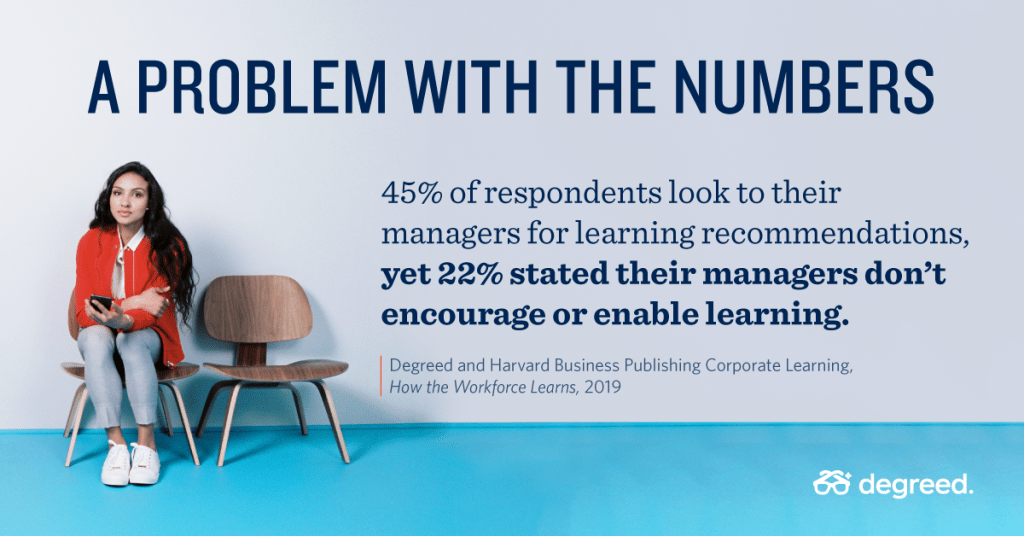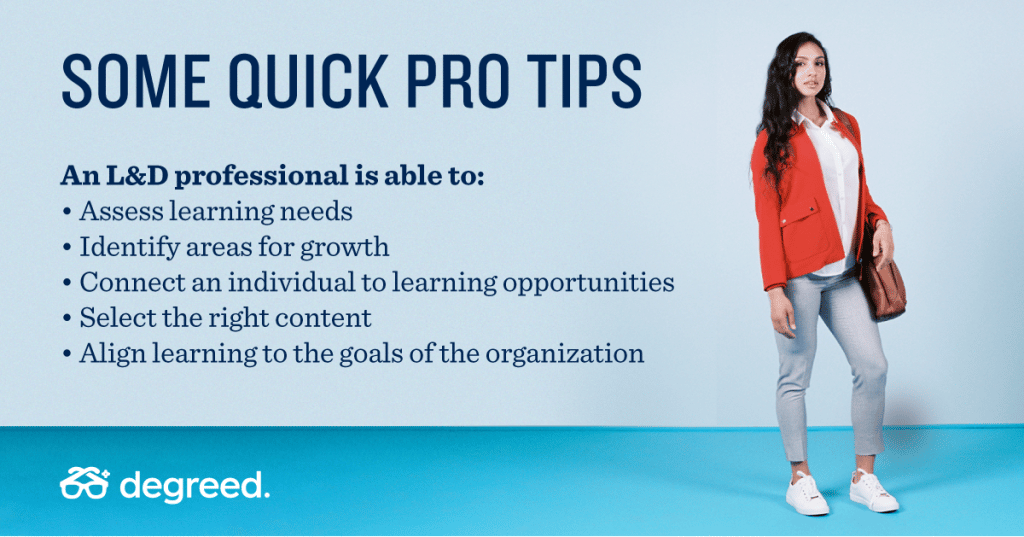Over half of all employees will require significant reskilling and upskilling by 2022, which means that as a learning and development (L&D) professional, you’re likely busier than ever before. And while there are no silver bullet answers, there are more resources at your disposal than you may think.
Your line managers are the perfect untapped resource to leverage while upskilling and reskilling our staff. By teaching frontline managers to be defacto L&D professionals, you can scale your efforts and prepare more employees for the future of work. Let’s take a look at how to make them champions of learning and why that matters.

Degreed and Harvard Business Publishing Corporate Learning surveyed 772 executives, managers and employees from all over the globe for the 2019 How the Workforce Learns Report and we discovered that managers play a crucial role in professional development. 45% of respondents look to their managers for learning recommendations.
This indicates that employees view managers as a trusted resource, yet one of the major challenges the workforce faces is alignment with their managers. 22% of those same respondents stated that their managers don’t encourage or enable learning. This poses both a challenge to L&D efforts as well as an opportunity for learning leaders to expand their reach throughout the company.
Providing employees with L&D opportunities has been shown to increase retention. In fact, in a recent survey by PWC, millennials ranked L&D opportunities as the number one benefit they look for from an employer, above pay and flexibility. By finding ways to empower managers to support the efforts of L&D, learning executives have the potential to make a positive impact on the organization as a whole. This can save money on recruiting and onboarding and ready employees for challenges of a dynamic global marketplace by ensuring that everyone has the skills for the future.

A good starting place for a manager development program is identifying the skills that managers need to support growth and development and become honorary learning and development professionals. An L&D professional is able to assess learning needs, identify areas for growth, connect an individual to learning opportunities, select the right content, and align learning to the goals of the organization.
Add to this the skills of a good coach, including giving and receiving feedback, active listening, and identifying strengths and weaknesses, and you have strong, empowered champions of learning across your organization.

Curated Pathways in Degreed are a great way to teach your managers these skills and help them grow their expertise. You can also share tips on how to create a strategy for one-on-ones that provides time for coaching conversations.
Pathways can also ensure that managers are preparing their employees for the future by sharing resources like the World Economic Forum Future of Jobs Report and research papers from credible sources, like McKinsey and PWC. When managers have a goal for the future workplace, they can help communicate directly to employees and motivate their team members to become lifelong learners, which is key to upskilling and reskilling your workforce.
But, what about the time between one-on-ones? How do managers build momentum for skill development, reskilling, and foster a continuous learning culture? This is where an LXP can help. With Degreed, your managers can share learning including things like articles, videos, whitepapers, and podcasts.
The Degreed Button enables your managers to add content to the learning catalog and share it with their employees with just a couple of clicks and without leaving the browser page. Managers can also assign learning, provide feedback with Skill Ratings, and set up Groups that facilitate a shared learning experience and discussion.
Add opportunities for line managers to engage in peer-to-peer learning and direct instruction from your L&D team and you’ll have a recipe for success and for scaling your learning programs. Together you can reskill the workforce for the future and ensure that your organization has the skills to remain competitive.
To learn more, watch our recent Ignition webinar here!
